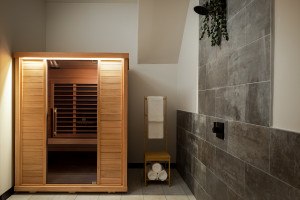How Barre Classes Helped This West Chester Woman’s Eating Disorder Recovery
Jenna Somerville shares how The Bar Method played an important role in her life.

Jenna Somerville, a soon-to-be graduate student, found strength in The Bar Method community to overcome her eating disorder. / Photograph courtesy of Jenna Somerville.
Who I am: Jenna Somerville (@j_somz), 23
What I do: This fall, I will be attending West Chester University as a full-time graduate student to get my Master’s in Social Work.
Where I live: West Chester
I looked in the mirror and thought to myself “I look fat.” I was 13 years old and thought what I saw was not “thin enough.” After that moment, I developed an eating disorder.
I began restricting my food intake. I started by becoming a vegetarian, which I believed was the perfect way to cut out a major food group. I carried a journal around with me, in which I would record what I ate, at what time, and the amount of calories that “meal” was. Most of my so-called meals consisted of coffee, gum, Cheerios, or veggies. At the end of the day, I would add up the calories and make it the next day’s goal to eat less than the previous day. I quickly became obsessed and addicted to being “skinny.”
Then I stopped eating in public. In high school, I avoided eating in front of people at all costs. I’d make up excuses, telling people I had already eaten, or that I was just picky and didn’t like what was available to me. I never went on a date in high school because dates involved eating in front of another human being. I spent most of my time in my room where I felt safe — a.k.a. not surrounded by food.
There was never a moment when food wasn’t on my mind. I was concerned with which oils food was cooked in, how many grams of sugar I had eaten, and whether or not the handful of almonds I ate were actually 75 calories. I started working out seven days per week solely to sweat because I believed the more sweat dripping off me meant the more calories were leaving my body. This became my world — my “normal” — and I became dangerously used to it.
I thrived on the “compliments” people gave me. Anytime someone would tell me they were so impressed with my willpower to not indulge or the strength it must’ve taken to not eat that cupcake, my eating disorder became a powerful force. But little did they know I was struggling in silence.
But then I was introduced to The Bar Method. I have always been willing to try the “next best thing,” so when a friend asked me to attend a barre class with her I thought, “Why not take a free workout class?” Really, though, I was hoping it’d be another place for me to sweat a ton and burn a lot of calories. At the end of that first hour-long class, I walked out feeling unaccomplished and unimpressed. I didn’t sweat like I did in my spin classes, so I figured if I wasn’t breaking a sweat, the workout was unsuccessful. The instructor told me I should come back again to get the hang of The Bar Method’s unique workout.
So I returned and my perspective started to change. The Bar Method is low impact, but it is working every muscle in your body in a way that isn’t deprivative. I started to realize that that kind of workout was better suited for me mentally. After a long road of not eating and working my body to exhaustion with a ton of cardio and calorie-counting, I finally realized how much I was hurting my body. I saw how sickly I looked and how much I was depriving myself.
The Bar Method was a major part of my recovery. It helped me develop a healthier vision of what working out meant to me: not about sweating for the sake of burning calories, but about gaining muscle and understanding how fitness can positively influence your wellness. The Bar Method taught me how to listen to what my body needed — like rest days, modifications, and proper nutrition — and helped me relearn how to love the body I have. With the help of the supportive, encouraging, and loving Bar Method community, I was able to finally admit out loud that I was struggling with an eating disorder and my body image. The Bar Method gave me the courage to go public about my struggles and seek therapy. Getting the help I needed also made me passionate about spreading awareness, just like organizations such as NEDA do. For instance, I will never compliment someone on how skinny they are now.

Somerville celebrates both her college graduation and her overall wellness journey. / Photograph courtesy of Jenna Somerville.
Now, I remain active because I want to, not because I feel like I have to. For years, exercising was a chore, something my disorder made me think I had to do every day. Now, I wake up excited to go workout. Each time I walk out of a barre class, I feel liberated and ready for the day. In a lot of ways, The Bar Method is my therapy session. It is my positive, uplifting, and empowering “me” time.
But my journey is mainly about personal and community strength. Growing up, I thought I was the only person in the world with an eating disorder. I felt so alone. Reaching out for professional help was scary, but my inner circle and Bar Method community reminded me to be brave. There is always someone who cares and who will help.


